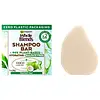What's inside
What's inside
 Key Ingredients
Key Ingredients

No key ingredients
 Benefits
Benefits

 Concerns
Concerns

 Ingredients Side-by-side
Ingredients Side-by-side

Water
Skin ConditioningSodium Lauryl Sulfate
CleansingCocamidopropyl Betaine
CleansingGlycol Distearate
EmollientParfum
MaskingCamellia Oleifera Seed Oil
Skin ConditioningAloe Barbadensis Leaf Juice
Skin ConditioningCocos Nucifera Oil
MaskingHistidine
HumectantSodium Citrate
BufferingSodium Xylenesulfonate
Sodium Chloride
MaskingDimethiconol
EmollientDimethicone
EmollientSodium Benzoate
MaskingSodium Salicylate
PreservativeGuar Hydroxypropyltrimonium Chloride
Skin ConditioningTea-Dodecylbenzenesulfonate
CleansingCitric Acid
BufferingTetrasodium EDTA
Trideceth-10
CleansingBenzyl Alcohol
PerfumingWater, Sodium Lauryl Sulfate, Cocamidopropyl Betaine, Glycol Distearate, Parfum, Camellia Oleifera Seed Oil, Aloe Barbadensis Leaf Juice, Cocos Nucifera Oil, Histidine, Sodium Citrate, Sodium Xylenesulfonate, Sodium Chloride, Dimethiconol, Dimethicone, Sodium Benzoate, Sodium Salicylate, Guar Hydroxypropyltrimonium Chloride, Tea-Dodecylbenzenesulfonate, Citric Acid, Tetrasodium EDTA, Trideceth-10, Benzyl Alcohol
Sodium Cocoyl Isethionate
CleansingHydrogenated Vegetable Oil
EmollientWater
Skin ConditioningPolyglyceryl-4 Laurate
EmulsifyingGlycerin
HumectantArgania Spinosa Kernel Oil
EmollientParfum
MaskingAloe Barbadensis Leaf Juice Powder
Skin ConditioningCocos Nucifera Oil
MaskingMyristyl Lactate
EmollientTetrasodium Glutamate Diacetate
Linalool
PerfumingCoumarin
PerfumingLimonene
PerfumingCitronellol
PerfumingCeramide AP
Skin ConditioningIngredients Explained
These ingredients are found in both products.
Ingredients higher up in an ingredient list are typically present in a larger amount.
Cocos Nucifera Oil is obtained from the kernels of the coconut fruit. In other words, this is coconut oil.
Coconut Oil is rich in fatty acids with lauric acid making up the majority of these. It also contains linoleic acid. Due to this high fatty acid content, coconut oil helps trap moisture and soften skin.
Despite being antibacterial, coconut oil may not be great for acne-prone skin. It is comedogenic and may clog pores. This ingredient may not be safe for malassezia or fungal acne.
Note: Coconut Oil should not replace your sunscreen for UV protection. Studies show it only blocks about 20% of UV.
This oil is non-volatile and has a light scent.
The term 'fragrance' is not regulated in many countries. In many cases, it is up to the brand to define this term. For instance, many brands choose to label themselves as "fragrance-free" because they are not using synthetic fragrances. However, their products may still contain ingredients such as essential oils that are considered a fragrance.
Learn more about Cocos Nucifera OilParfum is a catch-all term for an ingredient or more that is used to give a scent to products.
Also called "fragrance", this ingredient can be a blend of hundreds of chemicals or plant oils. This means every product with "fragrance" or "parfum" in the ingredients list is a different mixture.
For instance, Habanolide is a proprietary trade name for a specific aroma chemical. When used as a fragrance ingredient in cosmetics, most aroma chemicals fall under the broad labeling category of “FRAGRANCE” or “PARFUM” according to EU and US regulations.
The term 'parfum' or 'fragrance' is not regulated in many countries. In many cases, it is up to the brand to define this term.
For instance, many brands choose to label themselves as "fragrance-free" because they are not using synthetic fragrances. However, their products may still contain ingredients such as essential oils that are considered a fragrance by INCI standards.
One example is Calendula flower extract. Calendula is an essential oil that still imparts a scent or 'fragrance'.
Depending on the blend, the ingredients in the mixture can cause allergies and sensitivities on the skin. Some ingredients that are known EU allergens include linalool and citronellol.
Parfum can also be used to mask or cover an unpleasant scent.
The bottom line is: not all fragrances/parfum/ingredients are created equally. If you are worried about fragrances, we recommend taking a closer look at an ingredient. And of course, we always recommend speaking with a professional.
Learn more about ParfumWater. It's the most common cosmetic ingredient of all. You'll usually see it at the top of ingredient lists, meaning that it makes up the largest part of the product.
So why is it so popular? Water most often acts as a solvent - this means that it helps dissolve other ingredients into the formulation.
You'll also recognize water as that liquid we all need to stay alive. If you see this, drink a glass of water. Stay hydrated!
Learn more about Water